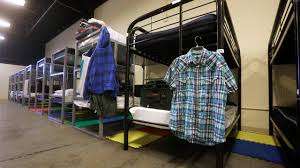Pros and Cons Of Homeless Shelters
Pros
Cons
- Basic Needs: Shelters provide essential resources like food, safe refuge, and hygiene facilities for those who would otherwise be on the streets. This can be critical for survival and overall health.
- Support Services: Many shelters offer programs and resources to help residents transition into permanent housing. This can include job training, addiction recovery support, and mental health services.
- Community: Shelters can create a sense of community for people experiencing homelessness. This can help reduce feelings of isolation and loneliness, and provide a network of support.
- Temporary Relief: Shelters are typically short-term solutions, and don’t necessarily address the root causes of homelessness like lack of affordable housing or mental health issues. This can lead to a cycle of going in and out of shelters.
- Safety Concerns: Shelters can be overcrowded, which can lead to safety concerns such as theft, fights, or the spread of illness.
- Privacy Restrictions: Shelters often have rules and curfews that some residents may find restrictive. There can also be limited privacy due to shared sleeping arrangements.
- Finding the Right Shelter: Shelters may not cater to everyone’s needs. For example, there may be a lack of shelters for specific populations like disabled individuals or LGBTQ+ individuals.
It’s important to remember that homeless shelters serve a vital purpose, but they are not a perfect solution. Ideally, shelters can be a stepping stone towards permanent housing and a chance to address the underlying causes of homelessness.
Resources:
- National Alliance to End Homelessness: This website has a search tool to find shelters, transitional housing, and other resources by zip code.
- HUD Exchange: The Department of Housing and Urban Development (HUD) provides a directory of homeless service providers, including shelters.
- SAMHSA National Helpline: 1-800-662-HELP (4357) – This 24/7 confidential, free, and multilingual helpline can connect you with local shelters and other mental health and addiction treatment resources.
- 211: Dial 211 from any phone to connect to a local information and referral service that can direct you to shelters and other services.
- United Way: Many local United Way chapters maintain lists of shelters and other emergency services.
- Local homeless advocacy organizations: Look for organizations in your area that work with the homeless population. They can often provide up-to-date information on available shelters.
- org: This website provides a national directory of homeless shelters.
- Family Promise: This organization provides resources for families experiencing homelessness, including a network of shelters.
- National Coalition for the Homeless: This organization advocates for policies and programs to help end homelessness.

